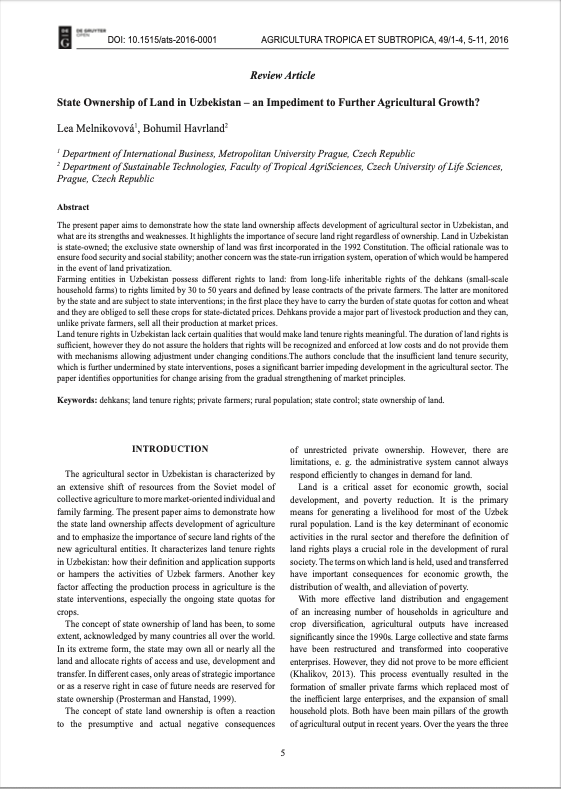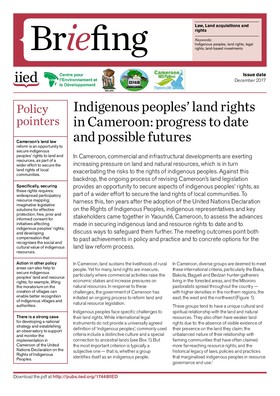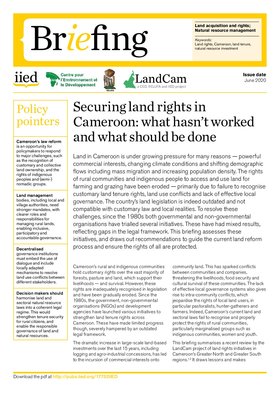Evaluation of pro - poor land administration from an end-user perspective: A case-study from peri-urban Lusaka (Zambia)
Peri-urban areas in Africa are usually dynamic with respect to land tenure. Statutory, informal and customary tenure systems often co-exist and interfere with each other. This disclosure of legal pluralism often leads to lower levels of tenure security, especially for people with low incomes. Pro-poor land administration tools have been designed to cater for the poor. The question arises whether these tools have the desired impact. This question is answered by confronting the existing tenure regimes with the pro-poor land administration tools.
In the Land of the Chiefs: customary law, land conflicts, and the role of the state in Peri-Urban Ghana
International policy is currently witnessing a renewed interest in customary tenure systems as well as traditional leadership, through which it aims to enhance the efficiency of local governance and create general access to and secure rights in land. Contrary to these ideas, practice reveals a lack of security of customary tenure in areas with a high competition for land. Mounting evidence displays that customary systems often evolve inequitably and that traditional elites benefit disproportionally from commodification of land.
Relations between land tenure security and agricultural productivity: Exploring the effect of land registration
This paper reviews the scholarly literature discussing the effect(s) of land registration on the relations between land tenure security and agricultural productivity. Using 85 studies, the paper focuses on the regular claim that land registration's facilitation of formal documents-based land dealings leads to investment in a more productive agriculture. The paper shows that this claim is problematic for three reasons. First, most studies offer no empirical evidence to support the claim on the above-mentioned effect.
In the Land of the Chiefs : customary law, land conflicts, and the role of the state in Peri-Urban Ghana
International policy is currently witnessing a renewed interest in customary tenure systems as well as traditional leadership, through which it aims to enhance the efficiency of local governance and create general access to and secure rights in land. Contrary to these ideas, practice reveals a lack of security of customary tenure in areas with a high competition for land. Mounting evidence displays that customary systems often evolve inequitably and that traditional elites benefit disproportionally from commodification of land.
In the land of the chiefs : customary law, land conflicts, and the role of the state in Peri-Urban Ghana
The central themes of this book are customary law, traditional leadership and local land management. International policy is currently witnessing a renewed interest in customary tenure systems and traditional leadership, through which it aims to enhance the efficiency of local governance, and create general access to and secure rights in land. Contrary to these ideas, practice reveals a lack of security of customary tenure in many areas.
Does property rights integrity improve tenure security? Evidence from China's forest reform
The purpose of this paper is to examine the impact of land property rights integrity, subdivided into use rights, mortgage rights, and transfer rights, on household perceptions of long-term tenure security in China. To this end, we establish a theoretical framework that links China's collective forest tenure reforms undertaken since 2003 to property rights integrity and two sources of tenure (in)security based on property rights theory: forestland reallocation and expropriation.
State Ownership of Land in Uzbekistan – an Impediment to Further Agricultural growth?
The present paper aims to demonstrate how the state land ownership affects development of agricultural sector in Uzbekistan, and what are its strengths and weaknesses. It highlights the importance of secure land right regardless of ownership. Land in Uzbekistan is state-owned; the exclusive state ownership of land was first incorporated in the 1992 Constitution. The official rationale was to ensure food security and social stability; another concern was the state-run irrigation system, operation of which would be hampered in the event of land privatization.
Indigenous peoples’ land rights in Cameroon: progress to date and possible futures
In Cameroon, commercial and infrastructural developments are exerting increasing pressure on land and natural resources, which is in turn exacerbating the risks to the rights of indigenous peoples. Against this backdrop, the ongoing process of revising Cameroon’s land legislation provides an opportunity to secure aspects of indigenous peoples’ rights, as part of a wider effort to secure the land rights of local communities.
Securing land rights in Cameroon: what hasn’t worked and what should be done
Land in Cameroon is under growing pressure for many reasons — powerful commercial interests, changing climate conditions and shifting demographic flows including mass migration and increasing population density. The rights of rural communities and indigenous people to access and use land for farming and grazing have been eroded — primarily due to failure to recognise customary land tenure rights, land use conflicts and lack of effective local governance. The country’s land legislation is indeed outdated and not compatible with customary law and local realities.
Making rangelands secure: Past experience and future options
Significant progress has been made over the past decade or so in the development of policy and legislation that support the recognition of customary rights to land, with important legal rulings in Tanzania, Uganda, Mozambique, South Sudan, and South Africa. At the same time, the strengthening of communities’ traditional rights to use resources has progressed through community forest reserves and community conservation areas.
Roles of land tenure reforms and land markets in the context of population growth and land use intensification in Africa
Land markets are evolving in response to increasing population pressure in Africa.
High population pressure leads to land use intensification on very small farms.
Population growth in densely populated rural areas leads to increasing rural–urban youth migration.
Tenure security enhancing land reforms enhance investments and sustainable land use intensification.
Pro-poor development strategies should target the strengthening of land governance.




